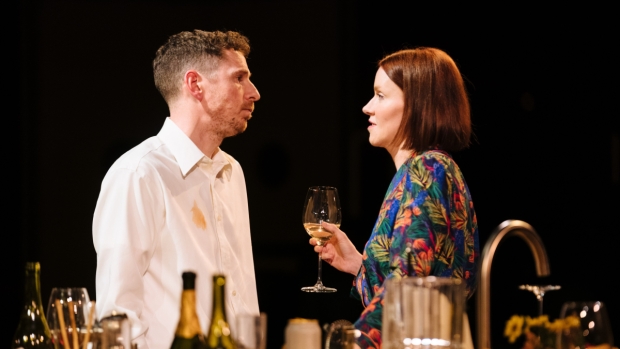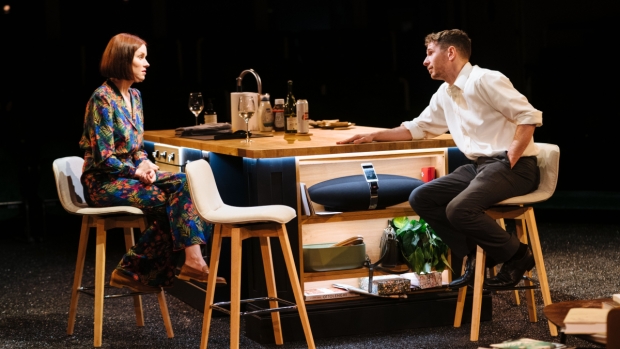”Beginning” at Royal Exchange review – David Eldridge’s two-hander finds a fresh start in Manchester

© Helen Murray
At first, they don’t seem compatible: she’s sharp, self-possessed and politically exercised, while he’s unassuming, pitiful and apathetic. But she lays her cards on the table: “I wanted you to stay.” With their union a foregone conclusion, the play instead becomes about the steps, half-steps and missteps to reach it.
Gerard Kearns and Erin Shanagher are charming as the couple. Kearns’ Danny is limp and droopy, his baggy shirt carrying a stain and his face a vacant expression, cluelessly unable to read signals. His voice is either rising as though seeking assurance, or flattened out, repressing behind his big, puppyish eyes. Shanagher’s Laura is springy like a bird trying to take flight, clenching her fists or grasping out as though wanting to be lifted up. It’s also full of small nervous gestures, constantly recomposing her hair or licking dry lips.
TK Hay’s set provides the kind of relationship landscape that’s at once familiar and murky for the man who warns her “it’s been a long time”. Clusters of furniture in Laura’s flat sit on dark gravelly tarmac, giving the sense of something taking shape — their incipient romance forming out of their rubble of baggage and uncharted emotional terrain.
It’s perhaps overstressed by the visual metaphor of two solitary lampposts facing opposite each other. Likewise, while director Bryony Shanaghan carefully balances stillness and movement, there are a few too many expansive silences and awkwardness is wrung out of every gesture.
The first half is all deflection and prevarication. Laura’s forwardness pushes him further into avoidance, body-swerving her advances and almost paralysed by them with blank stares. It initially has the same effect for an audience, the progression towards revelation and connection constantly short-circuited. But it becomes slowly absorbing in the second, as Laura’s lust fans out into something more complicated and Danny stops retreating.
What initially seems intimidation by her sexual confidence reveals itself as wariness around not falling into a repeat of his past relationship. What for her begins as a transaction of physical gratification is revealed as desperate longing for connection and company. You start to lean in as Eldridge gradually unfurls all these layers, but they could land with more weight; lots of pauses, deep breaths and covered faces make them muted and contained again almost as soon as they’re released.

© Helen Murray
Danny comes out of his shell to rescue her when he sees that she’s just as stranded and unmoored by childlessness and loneliness — never has a kitchen ‘island’ been so aptly named. The script relies too much on a cyclical pattern of charged discussion erupting into momentary self-exposure, undercut by bathos, then built back up and released again. But it’s effective in using speeches that trail off and flame out, with ellipses that hang as pleas for the other to step in.
And there’s something powerful in the cumulative effect of Eldridge’s play which seems to be about how fundamentally remarkable it is that two people do find a way to come together. Because there’s always some obstacle between them. Some emotional reckoning to navigate. Some mass of unanswered questions or unspoken feeling to unblock. Something to hide behind or get in the way. Until, eventually, there isn’t.















